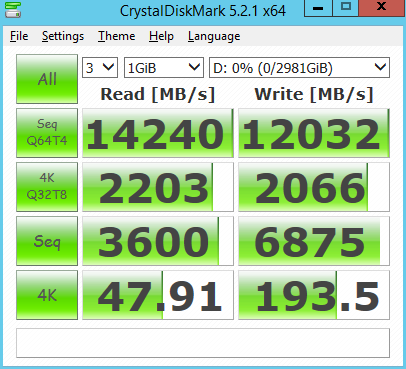CRYSTAL DISK BENCHMARK VER. 5.2.1 X64
Crystal Disk Benchmark is used to measure read and write performance through a sampling of random data which is, for the most part, incompressible. Performance is virtually identical, regardless of data sample so we have included only that using random data samples.
As much as we would always like to see those low 4k read and write speeds improve at the industry level in general, 14Gb/s read and 12GB/s write when looking at incompressible data is pure lightning.
The toughest benchmark available for solid state drives is AS SSD as it relies solely on incompressible data samples when testing performance. For the most part, AS SSD tests can be considered the ‘worst case scenario’ in obtaining data transfer speeds and many enthusiasts like AS SSD for their needs. Transfer speeds are displayed on the left with IOPS results on the right.
All in all, we weren’t really impressed with AS SSD results as the IOPS remained at a mil IOPS that we had seen previously, with throughput only jumping up 2GB/s, unlike that of what Crystal Diskmark displays. We see much the same with Anvil Disk Utility below…. pushing the limits of our software.
ANVIL STORAGE UTILITIES PROFESSIONAL
Anvil’s Storage Utilities (ASU) are the most complete test bed available for the solid state drive today. The benchmark displays test results for, not only throughput but also, IOPS and Disk Access Times. Not only does it have a preset SSD benchmark, but also, it has included such things as endurance testing and threaded I/O read, write and mixed tests, all of which are very simple to understand and use in our benchmark testing.
The same could be said when we tested in PCMark 8with a top score of 5084 and transfer speed of 583MB/s, much lower than one might expect from a 14GB/s RAID configuration.
 The SSD Review The Worlds Dedicated SSD Education and Review Resource |
The SSD Review The Worlds Dedicated SSD Education and Review Resource | 


this is insane…. @intel shame on your optane!
“we use a set length of 256mb” sb 256MB “and test both the read and write performance of various transfer sizes ranging from 0.5 to 8192kb.” sb 8192kB.
Is it possible to boot from this RAID?
No. The only way to boot from this device is to use a single drive as the boot drive and the remaining three in RAID; the speed of which is very similar to these tests.
not even with Intel VROC or this “WS C621E SAGE
“Motherboard?
VROC doesn’t work and, unless you can find a way to get a UEFI to recognize the RAID, it simply can’t be done. That feature is not part of the drive, where it may be with others. Any of the individual four SSDs can boot from that drive when not in RAID mode.